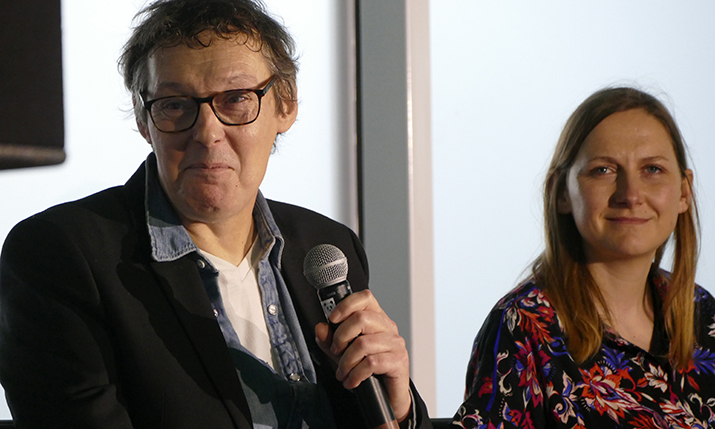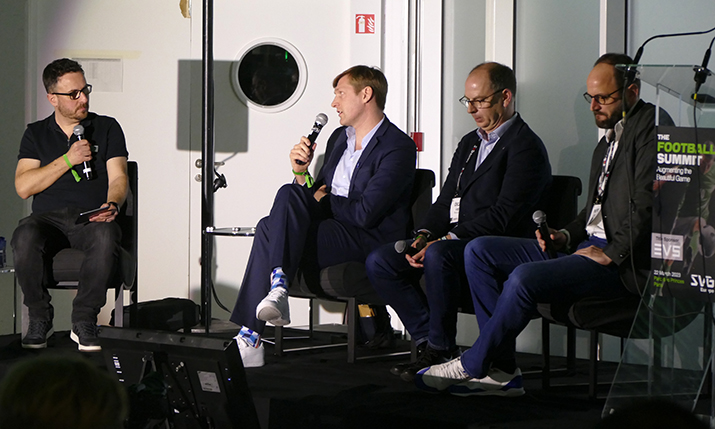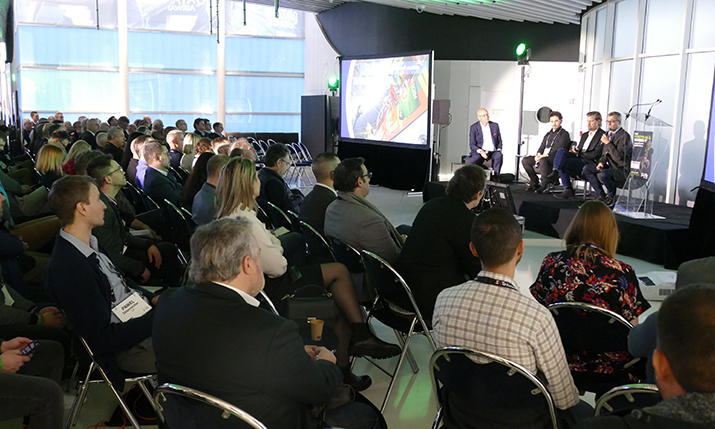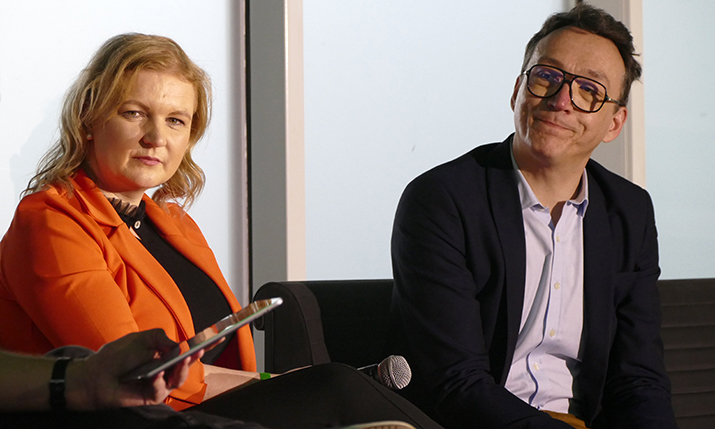Football Summit 2023: Fan engagement and technology innovations take centre stage in packed day of debate

How to engage younger audiences and the technology and techniques being used to enhance aspects of both match coverage and presentation were two of the key talking points at Football Summit 2023, held at the Parc des Princes in Paris, on 22 March.
After a welcome from Nicolas Bourdon, chief marketing officer at title sponsor EVS, directors Laurent Lachand (pictured above, left) and Sigrid Lelièvre (pictured above, right), who between them have worked on the Men’s and Women’s World Cup, the Champions League and Ligue 1 matches, kicked things off in style, sharing insights into the craft of live football directing.
“New, younger audiences are a huge focus for us and it’s important for us to put our values out there. We want to create innovative, inclusive content. Our ethos was to embrace the chaos.”
Lachand shared how he prepares for major matches such as the 2022 FIFA World Cup Final: “We need to be focused on the event but not under pressure, so we prepare as we prepare for every other match. During the first 70 minutes of the final we thought we were unlucky and it was going to be the worst final ever, and then everything changed!”
Lelièvre was also part of the team in Qatar but with a focus on non-match day coverage. This included press conferences, training sessions and pitch familiarisation. “A lot of content is produced around the World Cup to enhance the experience,” she explained. “We tried to find the small stories that were apparent on the pitch.”

Bruno De Roy, RTL Belgium, Philippe Oziol, HBS and Òscar Lago, Mediapro, discuss match innovations with SVG Europe’s Will Strauss (far left)
As the first woman to direct coverage of France’s Ligue 1, Lelièvre also shared how she approaches matchday. “My first thought is the viewer and how they’re going to experience the game. But you also have rightsholders and their value proposition and you have to understand those differences and explain that to the team so they can do their job.”
The viewer experience was also a key aspect of a two-part session exploring the creative choices and technical challenges behind managing and distributing immersive audio and images. Christian Gobbel, chief technology officer at HBS, said: “We are fortunate that with events such as the World Cup we can focus on quality in a way that leagues can’t.”
Felix Krückels, audio engineer, consultant and academic, then explained the journey of immersive audio that culminated in the “fully immersive” World Cup in Qatar. More than 80 mics were placed in the stadiums to achieve this. “I was told [the audio] was bigger than the picture, but the audio and the video have to fit together and you have to have the tools to achieve that balance.”
For Krückels is not just 3D audio that creates an immersive environment, “it’s perfect objects, consistency and the variety you can create”, he added.
Pablo Garcia, HDR workflow consultant and image supervisor, FIFA World Cup 2022, agreed on the need for consistency when he joined the conversation to discuss HDR. Progress has been impressive since the first tests in 2016 when “workflows were complex and creative possibilities were limited”, he said. The issue of HDR-SDR conversion continues to be a talking point, however. “There are different methods to convert HDR to SDR and all are correct,” stated Garcia. “The most important thing is that the HDR isn’t compromised. That’s why we decided to go with one method of conversion. I listen to the content creators to see what picture they want to create and we create it. I make sure the SDR follows. We are now establishing the look of the future.”

(L-R) SVG’s Ken Kerschbaumer, Pablo Garcia, HDR workflow consultant and image supervisor, FIFA World Cup 2022, Christian Gobbel, chief technology officer, HBS and Felix Krückels, audio engineer, consultant and academic
After a networking break, the focus turned to the all-important area of punditry and analysis. With viewer expectations of what half- and full-time analysis should look like. Lisa Fallon, high-performance football development consultant, head coach, and television and radio pundit, and Sébastien Audoux, former host and announcer, and outgoing head of sports digital content at Canal+, considered the next-generation of analysis, the tools required and how these can be used to meet the expectations not just of viewers, but also of editorial teams.
Next up, attendees were taken inside the Saudi Sports Company’s plans for a new remote production facility. Peter van Dam, chief technology officer at Saudi Sports Company, explained that progress is well underway on the production centre which will enable remote UHD-HDR live coverage of the Saudi Pro League. While the technical standards of the facility are high, the challenge has been finding people with the skills to staff it.
He said: “We need people who can tell the story. Football is more than 90 minutes. We need to include and train local people and give them passion but there is no real school or academy for this, so part of our goal is to build an academy.”
Ronald Meyvisch, technology consultant, added: “We have a few key, specialised people who quality check everything that comes in. By building four galleries and two hubs we can bring young people in to train and learn and we can get people into a real day-to-day production environment. This is a very quick way to train people to a level where they can start to contribute to productions.”

Lisa Fallon, UEFA Pro Licence Coach, RTÉ TV Football Analyst, and Global Football Technical Expert, and Sébastien Audoux, former host and announcer, and outgoing head of sports digital content at Canal+, discuss the next generation of punditry and analysis
The next generation was also the focus of a panel featuring Sky Deutschland SVP of sports production Alessandro Reitano and Jo Osborne, executive producer, Sky Sports. The pair have been at the forefront of the Sky Next Generation child-focused programming series, which began with a dedicated kids cast alongside the usual broadcast of Der Klassiker between Borussia Dortmund and Bayern Munich last year.
“I never saw a project in our company that electrified so many people,” said Reitano. “You have to approach it differently. We’re trained to be best in class and the highest quality but anything could happen here. It was a learning curve for the team.”
The concept was then shipped to the UK, where, Osborne said, “we just went for it. New, younger audiences are a huge focus for us and it’s important for us to put our values out there. We want to create innovative, inclusive content. Our ethos was to embrace the chaos and it was important to choose technology that made the kids feel comfortable and let them shine, rather than having tech for the sake of it.”
The response has been positive in both the UK and Germany, with Sky Sports hitting all its target audiences and Reitano reporting “100% positive” feedback on social media.
“We’re trained to be best in class and the highest quality but anything could happen here. It was a learning curve for the team”
The conversation then shifted to football club content, with Gavin Johnson, group media director at City Football Group, explaining the concept behind City Studios, Manchester City’s in-house production facility. Situated at the heart of the club’s training ground, he said the studios were built on three things – creativity, production talent and facilities.
“We create content to serve the fans,” he explained. “We try to look through the lens of what would appeal to us as fans. We also see content as a big lever for growth of the fan base.”
The numbers speak for themselves. In 2019 the club had around 3.7 million active users on Facebook; that was up to 28 million last month. YouTube figures are equally impressive, up from around 3.6 million active users in 2019 to 34-35 million last month.
“Investing in quality and talent and building relationships with the team allows us to create really authentic content,” he added.

Sky Deutschland SVP of sports production Alessandro Reitano (right) and Jo Osborne, Head of Women’s Sport, Sky Sports, highlight how broadcasters are attracting the next generation of football fans
The final panel of the day was made up of representatives from RTL Belgium, HBS and Mediapro showcasing some recent technical, presentation and product innovation highlights from their match coverage. Shallow depth of field cameras proved a particularly popular product choice for all three. Bruno De Roy, sport production manager, RTL Belgium, shared his experience of introducing a more cinematic look for Belgian Cup games, while Òscar Lago, match director, Mediapro, revealed the reaction he’d had to the new look for LaLiga matches. “The reaction of fans was as good as we expected, especially from young people. They compare this type of shot to what they see when they play games such as FIFA. We didn’t realise it would be so good and the fans would be so happy.”
“Investing in quality and talent and building relationships with the team allows us to create really authentic content”
Philippe Oziol, director of France production, HBS, agreed, saying they “bring a lot of drama” although they are not used for live coverage on Ligue 1, instead being reserved for player-focused content.
Other sessions on the day included a Thought Leader Perspective on piracy and content protection, featuring Steve MacMurray, digital media development manager at Globecast, Glodina Lostanlen, chief process officer at Imagine Communications, and Geoffrey Crespin, senior solutions architect – live video production security at EVS; and Chyron’s Diana Arsene who shared some lessons learned from live cloud production.
Tom Blake, commercial director, Imagen, and Tom Barnes, vice president, IMG Replay, revealed how the Turnstile media hub has raised the standard for the Premier League’s media asset management; and Norbert Paquet, head of live production solutions at Sony, LiveU senior manager sports EMEA, Bart Meeus, and Oliver Dumböck, co-founder & CTO, NativeWaves, provided insight into the football production challenges faced by the broadcast industry and offer up potential solutions.
Football Summit 2023, sponsored by EVS, took place in Paris on 22 March 2023. On-demand video recordings of the sessions will be made available next week.

